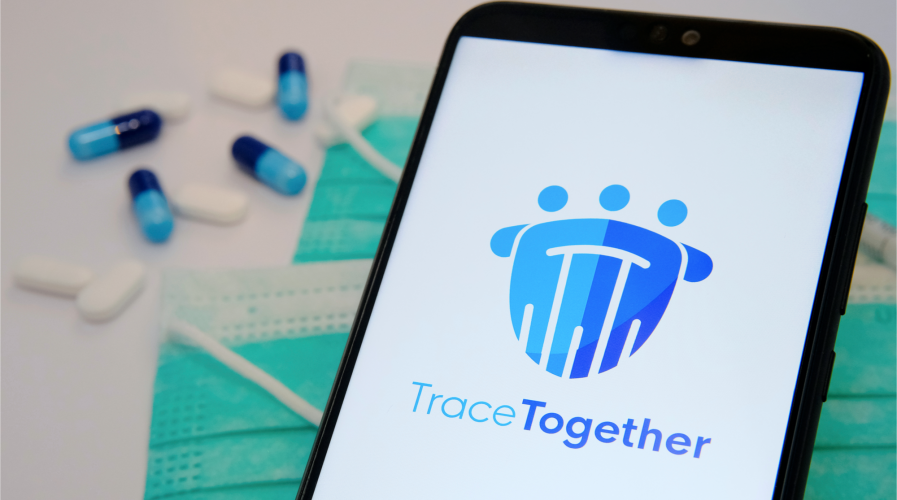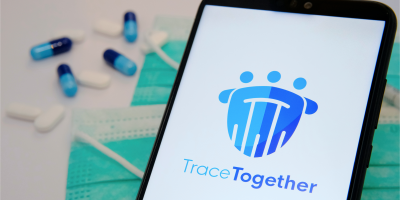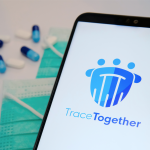
Singapore’s TraceTogether app. Source: Shutterstock
Are wearables the answer to contact tracing app problems?
- Contacting tracing apps are the community- and tech-driven approach to halting the spread of COVID-19
- But they have drawbacks and uptake has not been as effective as hoped
- Singapore is readying to deploy contact tracing wearables to millions of citizens. But data privacy concerns may linger
Across the world, companies have been rapidly developing their own contact tracing apps, leveraging the technology we have in our pockets – smartphones – in order to help further limit the spread of the coronavirus as lockdowns ease off.
Contact tracing apps aim to take a “community-driven” approach to combating the spread of COVID-19. When smartphones have the app installed, they exchange anonymized proximity data using Bluetooth. The information is stored on the device, and is supposed to only be shared with authorities if a user tests positive for the virus. After a period of time, roughly the known incubation period of the virus, the data is automatically deleted.
Singapore leads the contact tracing app surge
Contact tracing apps are an innovative solution leveraging technology most of us tend to have in arm’s reach – in theory, then, they should be effective.
Singapore led the charge in contact tracing apps weeks, if not months ahead of other countries. Its TraceTogether app has been used as a model for the initiatives around the world.
But despite a campaign to ensure citizens downloaded it, the Singapore government said just one in six people have actually done so, leaving a massive hole in the data, and undermining the crowdsourced process significantly. With more than 37,000 confirmed cases, Singapore has one of the highest reported number of cases in Asia.
According to the country’s development minister, Lawrence Wong, three-quarters of the population must have the app, and use it correctly, for it to be effective.
But there are other problems with the reliance on smartphones: increasingly, citizens will be interacting without them – such as when playing team sports, or singing in a choir, for example.
As reported by South China Morning Post, Lawrence Loh, an associate professor of business administration at NUS (National University of Singapore), pointed to other UX issues relating to the app’s poor uptake, including that the interface was “unexciting” and that the use of Bluetooth would drain users’ smartphone battery.
Wearable contact tracing tech
In answer to these issues, and ruling out mandatory uptake of TraceTogether, Singapore is now considering the use of wearable technology for more effective contact tracing, that could be distributed to everyone in the country.
“We are developing and will soon roll out a portable wearable device that will achieve the same objective as TraceTogether, but will not depend on possession of a smartphone,” Foreign Affairs Minister Vivian Balakrishnan said in parliament on Friday.
“If this portable device works, we may then distribute it to everyone in Singapore. I believe this will be more inclusive, and it will ensure that all of us will be protected,” he said.
While the minister didn’t state whether use of the contact tracing wearable would be mandatory, in light of the poor uptake of its app, the country must change tack. Singapore authorities have stated that a critical precondition for the country to ease lockdown measures further, beyond its current third phase, includes improving capabilities to control and contain outbreaks.
If a wearable device is distributed to the country’s 5.7 million citizens, it could become the most comprehensive tech-based contact-tracing effort globally.
But while the use of wearables may overcome the challenges of poor app download and usage rates, and the smartphone penetration, the announcement hasn’t done anything to quell one of the biggest blockers to contract tracing app adoption: data privacy.
While Singapore has assured that data collected through TraceTogether is encrypted, stored locally and eventually deleted, other countries following suit, such as Israel, won the authority to collect historic location data, with nothing technically stopping them from using it for other means.
Wearable contact tracing apps, which would be designed to fit on a keyring or in a purse, for example, would be even more difficult for users to scrutinize what the device is doing or what information is being used.
At a smaller scale, some businesses have already adopted wearables for contact tracing where smartphone usage is restricted, while other governments including Bahrain and Hong Kong have used them for monitoring people under quarantine.
There are already a number of vendors pitching contact tracing wearables. Devices would likely be surprisingly cheap, according to Reuters, with a simple wristband, bluetooth chip, battery and some memory costing around $10 or less.
READ MORE
- Ethical AI: The renewed importance of safeguarding data and customer privacy in Generative AI applications
- How Japan balances AI-driven opportunities with cybersecurity needs
- Deploying SASE: Benchmarking your approach
- Insurance everywhere all at once: the digital transformation of the APAC insurance industry
- Google parent Alphabet eyes HubSpot: A potential acquisition shaping the future of CRM


